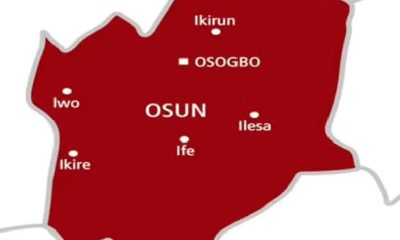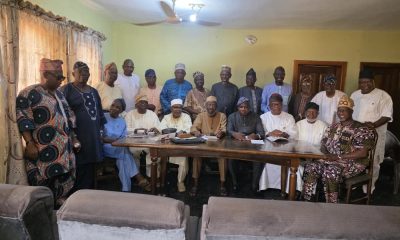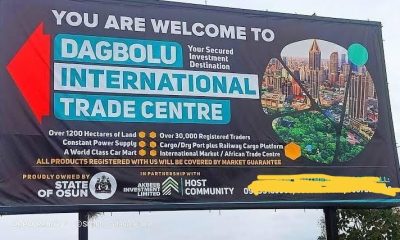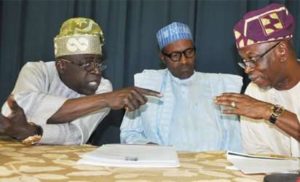News
APC In the Storm of Tinubu, Oyegun row
By Michael Olanrewaju
It is no longer news that the much expected battle to shake the ruling All Progressive Congress (APC) has started. Many political analysts had thought that the supremacy battle cannot start as early as it has done. This is because of the seemingly cohesive and highly disciplined posture of the party and its leadership.
However, the inherent schisms within the centre of the party leadership burst into the open last weekend. CityMirrorNews spoke to some political experts on this development. Some argued that the party cannot withstand the test of time as a result of foundational problems.
One of such foundational problems is dioptrically opposed ideological learning coming together to coalesce and farm the party. Such ideologues ask questions like; Can the leftist be in a political union? Can the liberal fuse with the conservative? Can the progressives and conservatives work together in a single political family? These and other questions begging for answers are the basis of the argument of the ideological class.
They argued further that the refusal to reflect on the political historical past before jumping into amalgamation of different political parties into one for the purpose of taken power accounted for the present crisis.
According to them, the late Sage, Chief Jeremiah Obafemi Awolowo was a welfarist who ran socialist ideological programmes that endeared him to the western region publics. This singular thrust elevated him above his peers in the anal of political evolution of Nigeria. Whereas, the strong man of Northern Nigerian politics, Alhaji Tafawa Balewa ran a conservative, pro-rightist programmess. The two can never forge a political alliance as a result of their diatrically opposed ideological learning.
Even, when Alhaji Aminun Kano emerged with the talakas (poor masses) ideology, which is socialism, an alliance with Awolowo was not possible as a result of sociological cultural perception and differences.
Thus, the polities of the first and second Republics of Nigeria in terms of membership were to a large extent determined by ideological learning of progressives versus the Conservatives and the Socialites versus the Capitalists.
This categorization, membership and commitment started crumbling with the long years of military involvement in Nigeria politics, illuminating in the third republic at a time that the bi-polar global East –West (socialist – capitalist) divide crumbled. Thus, the numbo-jumbo of people with different ideological backgrounds and learnings in a single political party made politicians to be carried away about party formation and development.
It is not surprising that at the formation of All Progressives Congress, many analysts described it as a marriage of strange bed fellows that is bound to crack. Or, how do you explain the fusain and co-habitation of hegemonies with democrats?
A school of thought sees the rise of APC as a gang up of a group of political elites mainly focused at displacing the other group of political elites in the PDP camp.
These pundits posited that it is the natural course of justice that those that are involved in the gang would not last, as some would betray each other along the line while some others too would gang up against the leadership produced. The extent to which this may be correct is better imagined.
The homogeneity expected in a national party almost fizzled out after the 2015 election. This is because cleavages to the old political party membership before their marriage started to show. This was a big challenge to unity and oneness expected in a political family arrangement of this nature. Thus members in the alliance started allying on the basis of defunct All Congress of Nigeria (ACN) All Nigeria Peoples party (ANPP), Congress of Progressive Change (CPC) as well as those who crossed from Peoples Democratic Party (PDP) respectively.
No sooner that the party emerged victorious in 2015 that inordinate ambition by several gladiators started setting in. The sharing of principal positions of leadership in the National Assembly accumulated crisis. The party is yet to get out of the crisis after more than a year in office. This has robbed off greatly on the activities of the 8th Legislative Assembly.
The inherent battle for the 2019 presidency within the party by the old blues represented by Alhaji Mohammed Abubakar Atiku and the new blues of Senate President, Dr. Abubakar Bukola Saraki, Kaduna State Governor, Nasir el Rufai and Sokoto State Governor, Aminu Taubuwal are parts of the factors for the friction within the party. The individual ambition of the big Political gladiators including the “God fathers” is impeaching the ability of the party to crystallize together as a single entity.
This is not to talk of the inability of the government produced by the party to have a firm and permanent grip over security branches in the North East, the South East and Niger Delta in the South South. This is coupled with chromic economic recession which has continued to have severe effect on the citizenry.
How visible for those contemplating formation of a new political party? Do they have the wherewithal to challenge the entrenched APC and PDP? Are their members not going to be the same political elites, their “God father” and their acolytes? There is no doubt that Nigeria presently have weak politically institutions in Government and opposition. The present generation of leadership needs to examine critical how to bequeath an enduring, strange united political system to the upcoming. The future of this country should be addressed now as a stitch on time saves nine.
-

 Opinion4 days ago
Opinion4 days agoThe Clout-chasing Dipo Awojide By Comrade Da’Peace
-

 News3 days ago
News3 days agoRamadan, Lent: Shettima Calls For National Unity And Compassion
-

 News5 days ago
News5 days ago2026: Let’s Work Hand In Hand To Ensure Party’s Victory, APC Igbimo-Agba Osun Urges Ex-guber Aspirants, Party Members
-

 Opinion3 days ago
Opinion3 days agoReinventing Osun’s Economy Through Dagbolu Intl. Trade Centre: From Quiet Market Lessons To Regional Trade Revolution By Adeboye Adebayo



